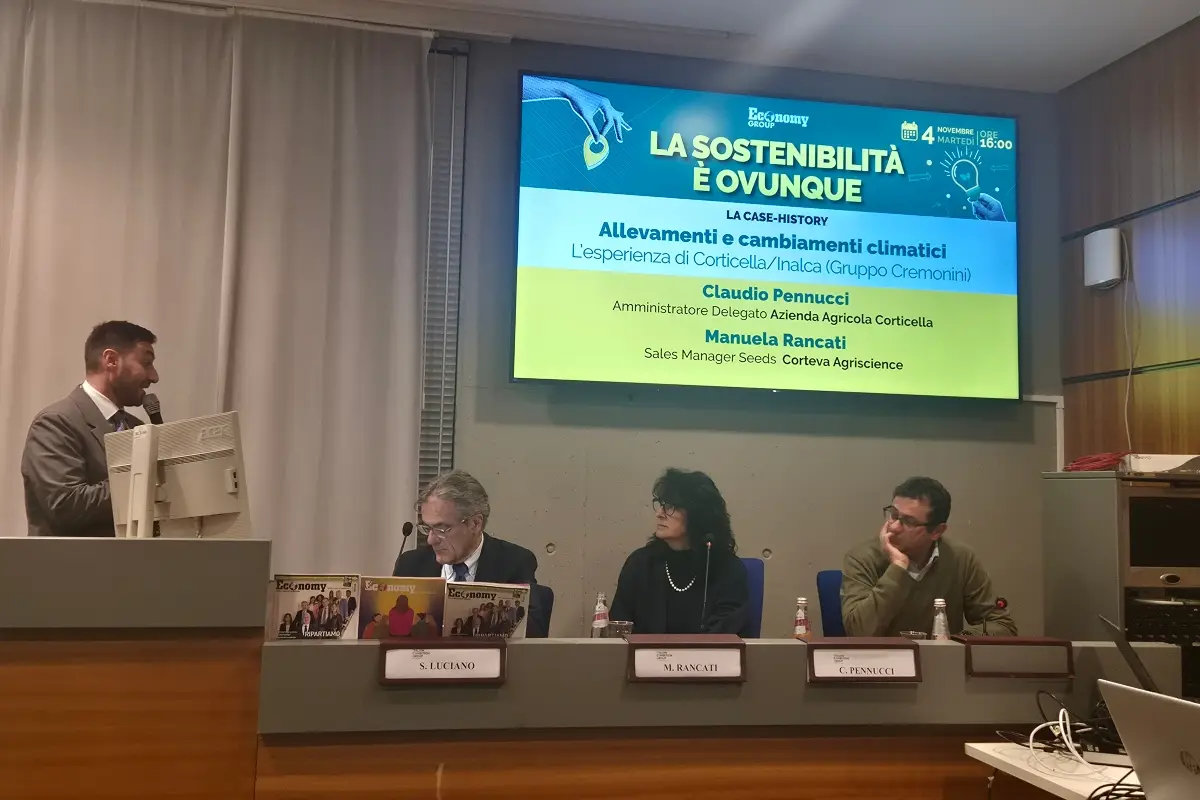
Ecomondo. Inalca: Livestock Farms Address Climate Change
The agricultural and livestock hub's mitigation program and partnership with Corteva were presented. /Gallery

Inalca, a leading Italian and European producer and distributor of beef, cured meats, and food products, was a key player at Ecomondo at the Rimini Fair, speaking at the conference on "Livestock Farming and Climate Change," organized by Economy Group.
The company is committed to reducing the environmental impact of livestock farming, protecting its nutritional, economic, and social value. Over the past 20 years, it has consistently invested in the agriculture and livestock sector, where the majority of the meat supply chain's environmental impacts are concentrated. This integration with the primary sector has allowed Inalca to create an agro-livestock hub, managed by its subsidiary Azienda Agricola Corticella, which today boasts over 2,300 hectares of land spread across Lombardy, Veneto, and Emilia-Romagna, dedicated to the production of its own fodder.
A significant percentage—about 70%—of the feed for the cattle is produced on these lands. Thanks to these numbers, Inalca is among the largest Italian breeders of beef cattle (calves, steers, and heifers), with a production capacity, in terms of animals raised directly or through sharecropping, of approximately 180,000 cattle per year.
Corticella, together with its partner Corteva Agriscience, presented at Ecomondo the agronomic/livestock mitigation and adaptation program launched with the aim of introducing and evaluating the impact of innovative agronomic practices for the production of forage for beef cattle. The goal is to reduce emissions, increase crop productivity, optimize fertilizer use, improve soil management, and increase carbon sequestration.
Claudio Pennucci , Corticella's agronomic director, explained that "over the next three years, the Inalca group will implement an application trial at its agro-livestock centers, managed by the Corticella company. This trial will focus on three areas. The first concerns the creation of new cropping systems: cultivation patterns that best adapt to soil, climate, and market conditions will be tested, using both established and new crops (due to climate change). The second area concerns soil management: having comprehensive meteorological and physical-chemical data will allow for less impactful and more eco-sustainable practices. Finally, for each crop, a process will be initiated to develop technical guidelines to rationalize the use of agronomic inputs, and specific practices will be adopted. This trial is consistent with other activities developed by the company for the recovery and valorization of organic substances for soil fertilization obtained through circular economy processes, such as the "digestate" from Inalca's biogas production plants."
The conference also presented the results of a pilot project conducted with Corteva Agriscience, which resulted in an average 19% reduction in CO₂ equivalent emissions per ton of forage produced. This was achieved through the adoption of innovative agronomic practices and the rational use of manure stabilized with the nitrification inhibitor Instinct and the nitrogen-fixing biostimulant BLueN, which improve nitrogen efficiency. The study was conducted using an LCA approach by the Department of Agricultural and Environmental Sciences of the University of Milan, Corteva's technical partner for projects related to sustainability and regenerative agriculture.
“This collaboration with Inalca demonstrates that sustainability and productivity can coexist,” said Manuela Rancati , Sales Manager for Pioneer, a Corteva seed brand. “Through regenerative agriculture and precision technologies, we help farms improve soil fertility, reduce emissions, and maintain high production and economic efficiency.”
Finally, during the conference, the "Infinite Ecosystem" (or "Infinite Cycle") was presented: a representation of the circular and regenerative economy of Inalca's beef supply chain. The company specializes in processing all beef products and by-products and is able to valorize them, placing them optimally on national and international markets. Furthermore, Inalca's activities contribute synergistically to other supply chains, from milk to leather goods, from biomedical to cosmetics, from pet food to the world of renewable energy. Alongside its production facilities, over the years Inalca has developed a full-fledged energy infrastructure for self-generation and the use of renewable sources. Animal manure and waste from agricultural and industrial activities, thanks to cogeneration, biogas production, and bone and fat recovery plants, constitute a valuable biomass for the production of energy from renewable sources and for the production of organic fertilizers that are reused in the agricultural cycle. Added to this is the significant production of solar energy, provided by the photovoltaic systems installed on all the factories and on the agricultural companies.
EFA News - European Food Agency